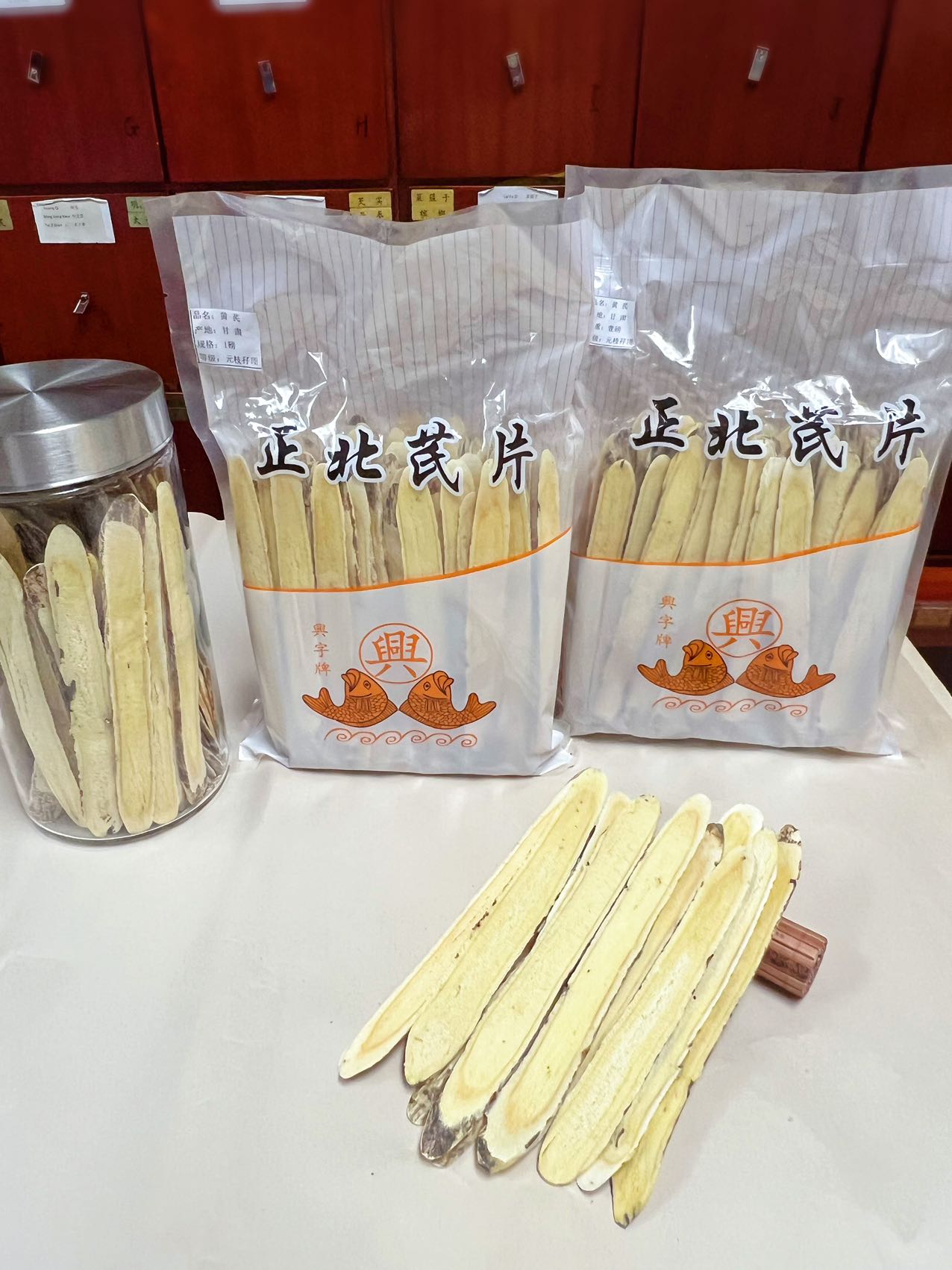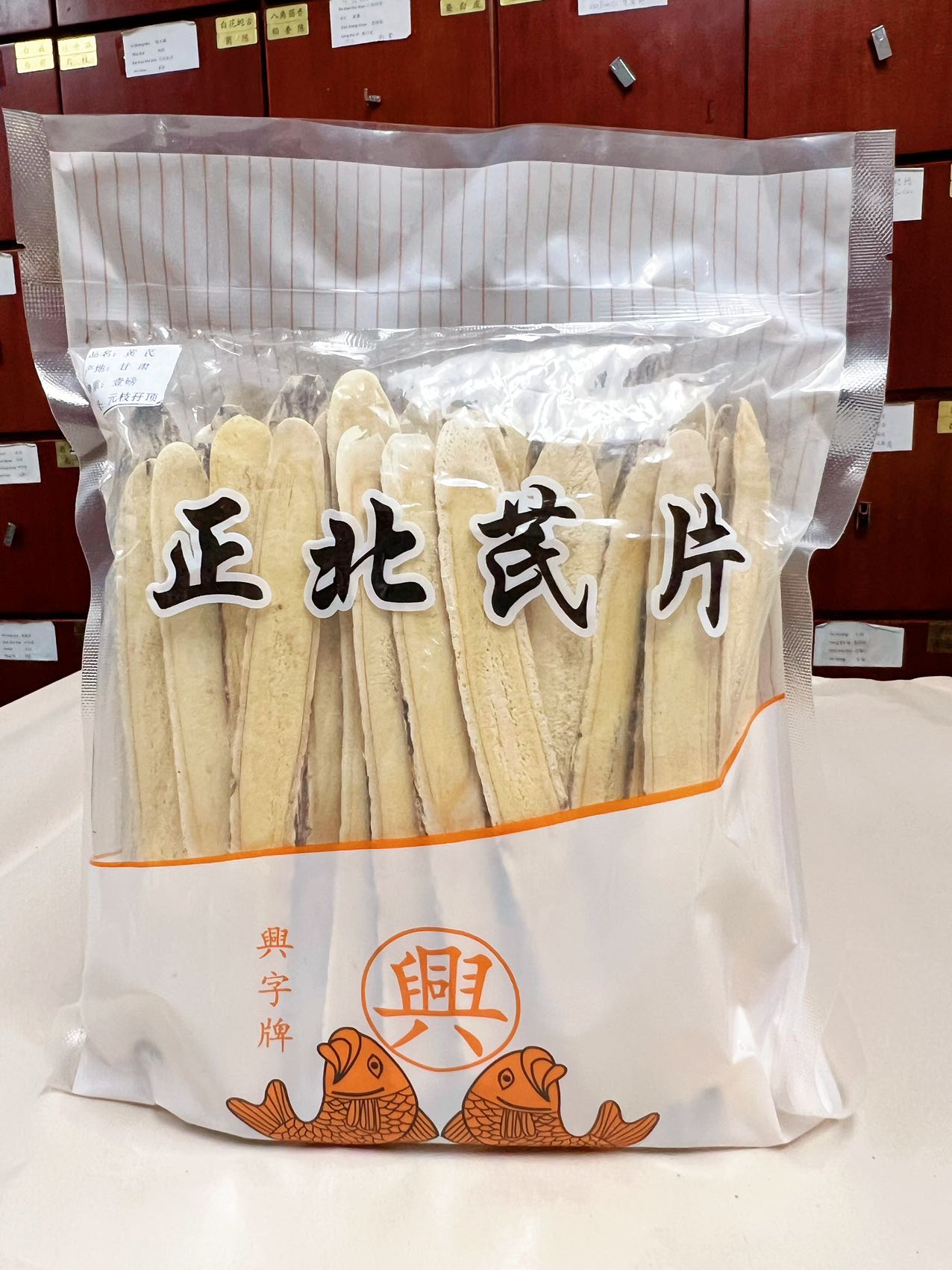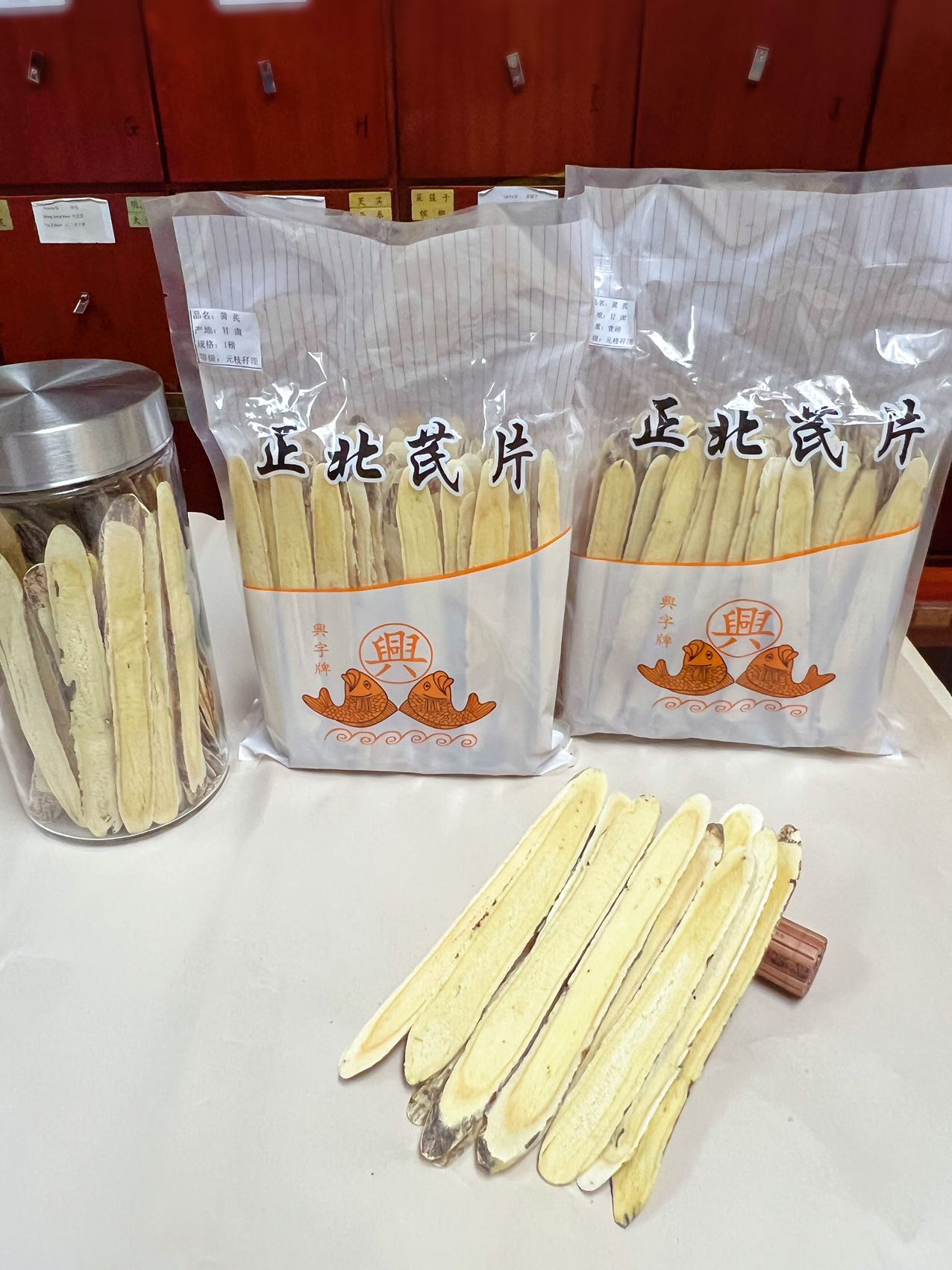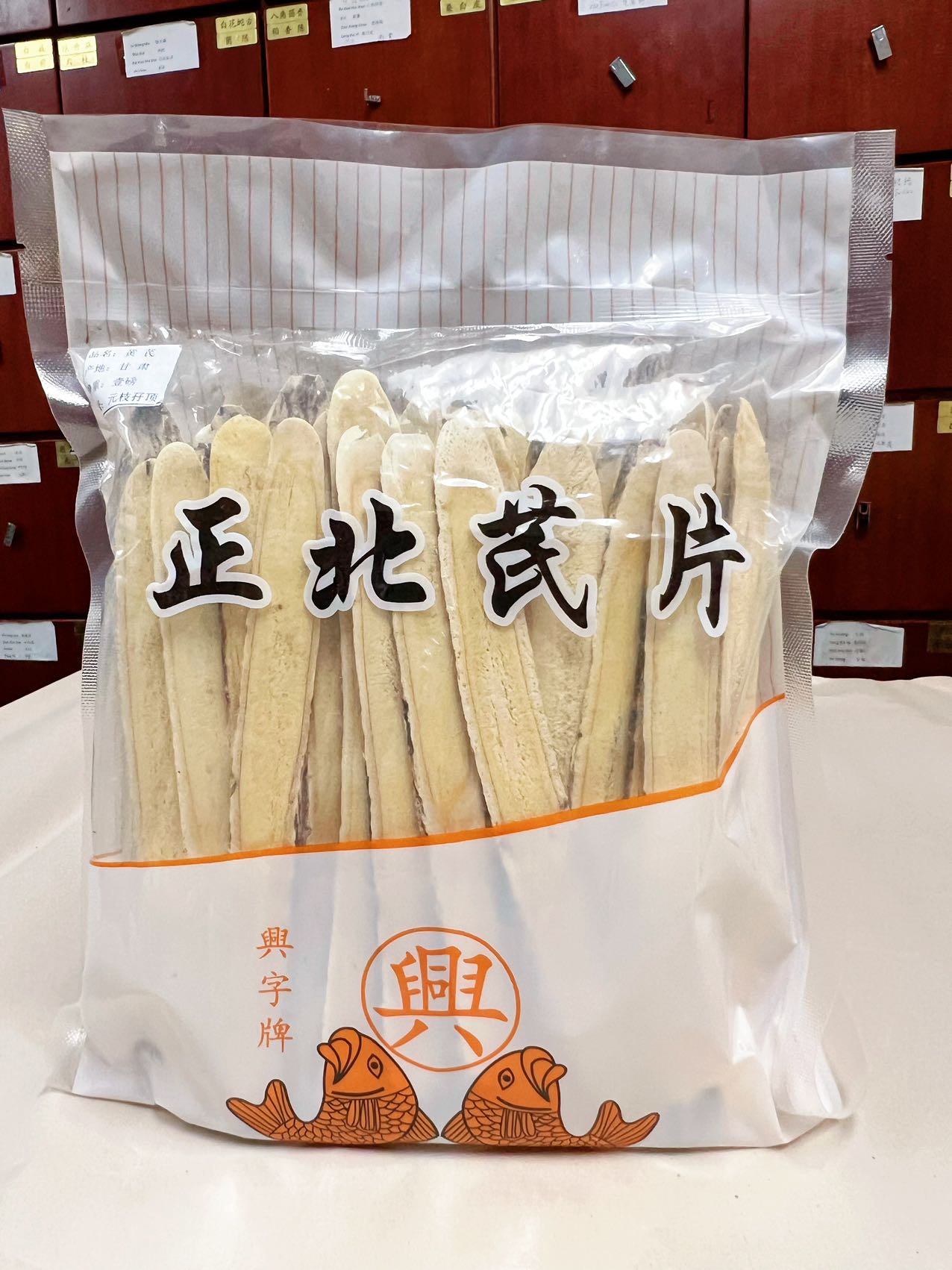1
/
of
2
Loho Acupuncture and Chinese Herbal Medicine
Bei Qi Pieces (Astragalus Root, Astragalus Membranaceus, Astragalus)
Bei Qi Pieces (Astragalus Root, Astragalus Membranaceus, Astragalus)
Regular price
$58.00 CAD
Regular price
Sale price
$58.00 CAD
Unit price
/
per
Couldn't load pickup availability
Can be taken with Zhi Gan Cao for boosted immunity effects!
1 lb authentic, natural Bei Qi in bulk herb (sealed bag)
Common names: Astragalus Root, Radix Astragali, Goat's Horn, Huang Qi, Membranous Milkvetch Root
Scientific name : Astragalus Membranaceus
Family: Legume
Parts used: Root
Main Medical Uses: Treats Arthritis, Asthma, Nervous Conditions, Shortness of Breath, Fever, Allergies, Anemia, Kidney Disease, Hepatitis, Stomach Ulcers and Digestive Disturbances
Benefits:
Astragalus Root invigorates vital energy, promotes diuresis, relieves edema, heals skin wounds and promotes muscle regeneration. Used to treat arthritis, asthma, nervous conditions, shortness of breath, fever, allergies, anemia, kidney disease, hepatitis, stomach ulcers and digestive disturbances.
Quality Assurance: The Herb Depot offers premium whole natural herbs, mostly wild harvested and farm grown from quality, clean, pesticide-free plants from China. We directly order from our trusted Canadian suppliers who import from TCM manufacturing approved facilities.
Based on standardized traditions of Chinese Medicine, the process of selecting, slicing, drying, sterilizing, fermenting, roasting, and steaming has been applied to achieve best properties and efficiencies of each herb.
Caution: Use single Chinese herbs with caution; professional healthcare advice is recommended. Chinese herbs are generally combined in herbal formulas to work effectively together for desired results, and to minimize potential side effects. You can search our extensive collection of patent Chinese medicine to find the formula with the utilized herb most suitable for your health needs.
(Please note: Photos are for illustrative purposes only. Actual color, cut, and size may vary)
1. Nourish the spleen and replenish qi
It is used for weak spleen and stomach, poor appetite, loose stools, fatigue, spleen deficiency diarrhea, chronic diarrhea and prolapse of the anus. Beiqi has strong Qi-tonifying effect and is good at replenishing lung Qi. It can treat shortness of breath due to lung deficiency, low voice and lazy speech, fatigue and weakness, and easy cold. It is often used with Codonopsis, Atractylodes, Chinese Yam and Roasted Licorice. Beiqi made with honey has stronger tonic effect.
2. Strengthen the exterior and stop sweating
Used for spontaneous sweating due to deficiency of the exterior. Beiqi has the property of replenishing qi and reaching the exterior, so it can replenish qi and strengthen the exterior to stop sweating. Beiqi has a good effect of strengthening the exterior and stopping sweating. Clinically, it can treat various sweating diseases through different compatibility; it can be used with yang-boosting drugs to treat spontaneous sweating due to yang deficiency; it can be used with qi-tonifying drugs to treat spontaneous sweating due to qi deficiency; it can be used with tonic drugs to treat night sweats due to yin deficiency . If the qi and blood are insufficient and the person is exposed to wind and cold, he often cannot sweat. When combined with Huangqi in the antipyretic drugs, it can invigorate the yang qi, replenish the source of sweat, and make him sweat. This is the reason why it is said that "Huangqi can stop sweating when there is sweating, and can induce sweating when there is no sweating". It is suitable to be used raw at this time.
3. Replenishing Qi and Raising Yang
It is used for the symptoms of Qi deficiency and sinking. Traditional Chinese medicine believes that the sagging of organs is due to the sinking of the middle Qi. Beiqi is good at replenishing Qi and raising Yang, and can treat rectal prolapse , uterine prolapse, gastric ptosis, kidney ptosis, and metrorrhagia caused by Qi deficiency and blood loss. Traditional Chinese medicine uses Buzhong Yiqi Decoction to treat various symptoms of organ sagging. Beiqi in Buzhong Yiqi Decoction is taken for its Qi-replenishing and ascending nature, which can raise the clear Yang of the spleen and stomach. At this time, it is suitable to be used after being processed with honey.
4. Diuresis and swelling
It is used for edema due to qi deficiency, and is often used with Atractylodes macrocephala, Stephania tetrandra, roasted licorice or cinnamon twig and Poria cocos, such as Fangji Huangqi Decoction and Fangji Fuling Decoction. It is often used to treat proteinuria in chronic nephritis and late stage diabetes.
5. Drain pus from sores
It is used for carbuncle due to qi deficiency that has not ulcerated for a long time, or has not healed after ulceration for a long time. It is often used together with Codonopsis pilosula and cinnamon bark. This product can replenish qi and strengthen the spleen, promote the early ulceration of pustules and the regeneration of muscles, and has the effect of draining pus and promoting muscle regeneration.
Beiqi is an important Qi-tonifying herb that can tonify the Qi of the whole body. It can tonify the spleen and stomach, tonify the lungs and replenish Qi, tonify Qi and consolidate Qi, tonify Qi and reduce swelling, tonify Qi and generate blood, tonify Qi and dredge the meridians, tonify Qi and elevate Qi, tonify Qi and expel poison, and discharge pus and generate new muscles. The ancients praised Beiqi as "the best of all Qi-tonifying herbs."
In addition, Chinese medicine believes that replenishing qi helps produce blood, so when treating various blood deficiency syndromes, adding Beiqi and Codonopsis to replenish qi can enhance the blood-replenishing effect, such as Guipi Decoction, which has the effects of strengthening the spleen and nourishing the heart, replenishing blood and replenishing qi. Beiqi also has the effect of lowering blood sugar, so it is often used in combination with Chinese yam, raw rehmannia, Radix Trichosanthis, and Schisandrae Chinensis to treat diabetes (diabetes). The use of Beiqi during cancer radiotherapy and chemotherapy can enhance the effect of anticancer drugs, reduce the adverse reactions of radiotherapy and chemotherapy, protect normal cells, and prevent bone marrow suppression. Another famous Chinese medicine prescription is Buyang Huanwu Decoction , which uses 4 liang of Beiqi in the soup to treat hemiplegia caused by sequelae of stroke , with very good results.
Symptoms such as loss of appetite, loose stools, shortness of breath and fatigue caused by spleen and lung Qi deficiency; symptoms such as long-term diarrhea, prolapse of the anus, prolapse of the uterus , and ptosis of internal organs (gastric ptosis, etc.) caused by sinking of the middle Qi; symptoms such as bloody stools and metrorrhagia caused by Qi deficiency and inability to retain blood; spontaneous sweating due to deficiency of Wei Qi; carbuncles that do not ulcerate or ulcers that last for a long time due to insufficient Qi and blood; edema and oliguria caused by Qi deficiency and poor circulation; numbness of limbs , joint pain, hemiplegia caused by Qi deficiency and blood stasis; diabetes caused by Qi deficiency and loss of body fluid, etc.
4.1 Dosage
Dosage: 10-30 grams. Large doses can be 60-120 grams.
4.2 Taboos
Caution: Avoid taking this medicine if you have severe exterior evil, qi stagnation and dampness obstruction, internal food stagnation, yin deficiency and yang hyperactivity, or if you are just starting to have carbuncle or have severe heat and toxicity after ulceration.
The commonly used dosage of Beiqi is 9 to 30 grams. Because Beiqi raises yang and helps fire, and is slightly warm in nature, it is not suitable for patients with excessive evil qi, no sweat, hyperactivity of yang and heat toxicity.
Recommended way to eat: Astragalus and Cistanche stewed with pork
Keywords: tonifying the kidney and strengthening the exterior, moistening dryness and relieving constipation
Today, I recommend a soup for the elderly to keep healthy in the cool and dry autumn. It is a stew of pork with Astragalus, Cistanche and Hemp Seed. Astragalus is a Qi-tonifying herb that can benefit the body and strengthen the exterior, promote diuresis and reduce swelling; Cistanche is a Yang-boosting and kidney-tonifying herb that can nourish the kidney, benefit the essence, moisten dryness and lubricate the intestines; Hemp Seed is a moistening herb that can moisten dryness, lubricate the intestines, relieve stranguria and promote blood circulation. All of them are warm, flat and sweet in taste. The combined soup is sweet, moist and mellow, and has the effects of nourishing the kidney and strengthening the exterior, moistening dryness and relieving constipation. It is also one of the best soups for families during the dry autumn.
Ingredients: 20 grams of Astragalus membranaceus, 12 grams each of Cistanche deserticola and Hemp seed (available at Chinese medicine stores), 400 grams of pork belly, and 3 slices of ginger.
Cooking: Wash all ingredients separately, cut pork into pieces. Put them into a clay pot, add 2500 ml of water (about 10 bowls), boil over high heat, then simmer for 1.5 hours, add appropriate amount of salt. This amount can be used by 3-4 people.




